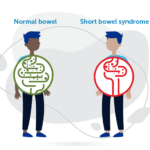Studies pinpoint risk factors for complications of pediatric intestinal failure

Pediatric intestinal failure occurs when patients lack the amount of intestine necessary for growth and development. As advances in treatment have led to better survival rates for children with short bowel syndrome and other forms of intestinal failure, the team at Boston Children’s Center for Advanced Intestinal Rehabilitation (CAIR) is studying factors that affect quality of life in these patients. Here, the CAIR team — including the center’s associate surgical director, Biren Modi, MD, MPH, and medical director, Christopher Duggan, MD, MPH — shares findings from three recent studies.
Patients with severe intestinal failure at risk for venous thromboembolism
Children with intestinal failure often must rely on parenteral nutrition (PN), which requires the long-term use of central venous catheters (CVCs). Modi and his colleagues sought to quantify the rate of venous thromboembolism (VTE) in this patient population and identify independent risk factors for this potential complication of CVC use. In a retrospective analysis of 263 pediatric patients, published in The Journal of Pediatrics, they found that about 28 percent developed VTE. Using a higher number of CVCs and having an early gestational age were independent risk factors for developing VTE.
For your practice: The findings highlight the need for prospective studies in this area and serve as a reminder for clinicians to be vigilant of the risk for VTE in patients with intestinal failure who require CVCs.
Antibiotic therapy improves small bowel bacterial overgrowth
Small bowel bacterial overgrowth (SBBO), or the presence of abnormally high pathologic bacteria counts in the small bowel, is a common occurrence in children with intestinal failure. However, clear guidelines for its management are currently lacking. To learn more about the effect of antibiotic therapy on SBBO, Alexandra Carey, MD, and her colleagues reviewed clinical data from 56 pediatric patients with SBBO who were seen by CAIR. They found that children who underwent endoscopy and six months of targeted antibiotic treatment experienced significant improvements in symptoms such as vomiting, abdominal pain, and feeding intolerance, as well as increases in BMI and weight. The study was published in the Journal of Pediatric Gastroenterology and Nutrition.
For your practice: The findings will need to be confirmed with prospective studies and long-term follow-up, but they verify that current strategies for antibiotic therapy are in fact helpful in treating eligible patients with SBBO.
Chronic inflammation in children with intestinal failure: What’s the connection?
Some children with intestinal failure also have chronic intestinal inflammation that resembles inflammatory bowel disease (IBD). However, it’s still unclear what factors predispose these patients to inflammation. The team reviewed the cases of 30 pediatric patients who had both intestinal failure and chronic intestinal inflammation, as well as those of 60 control patients. They identified SBBO, current use of PN, and longer use of PN as factors associated with chronic intestinal inflammation in patients with intestinal failure. The study, published in the Journal of Pediatric Gastroenterology and Nutrition, also showed that the severity of inflammation was linked to escalation of therapy to steroids or biologic drugs.
For your practice: Along with pinpointing risk factors for chronic intestinal inflammation, the results bring into question whether conventional IBD therapy is appropriate for this patient population. They also suggest that monitoring fecal calprotectin and other laboratory values may be useful when assessing the risk of chronic inflammation and in monitoring the response to therapy.
“These studies are a part of a more concerted effort by our group to understand some of the long-term implications of living with short bowel syndrome and intestinal failure,” says Modi. “Following the tremendous successes we have had over the past several decades in improving survival in our patients, we are now recognizing the comorbidities that are associated with this chronic disease and are aiming our research efforts at identifying them so that we can continue to improve the lives of our patients.”
Have questions or want to refer a patient? Contact the Center for Advanced Intestinal Rehabilitation.
Related Posts :
-

Growing up with short bowel syndrome: Follow-up care matters
Short bowel syndrome, a serious condition in which a child lacks sufficient small intestine to absorb the nutrients the body ...
-

Doing everything possible for Gabby: A team approach to short bowel syndrome
Gabriel “Gabby” Lopez loves everything hot and spicy. “He will eat a ghost pepper without hesitation,” says his mother, Mayra. “...
-

A taste of childhood: One family’s journey to an IV-free diet
Children with short bowel syndrome often miss out on childhood’s simple and delicious pleasures, like birthday cake, ...
-

Predicting feeding difficulties in children with esophageal atresia: A proactive approach
Children with esophageal atresia are at risk for developing anastomotic strictures, or areas of esophageal narrowing, following surgical repair. Clinicians ...





